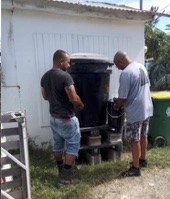- Linda Smith, PhD
- Jan 22, 2020
Updated: Jun 2, 2021
From Home Depot to Installation

Examining 200 gallon drums at the local Home Depot. Adolfo was hosting a fun competition for the most unique and functional truck bed design. Little did he know that days after his design was voted the best, his family would be living in the truck after their home collasped in the earthquake. His expert advice in using Rubber Maid buckets for the interior three filter units provided a sturdy and long lasting system worthy of providing years of safe water through hurricanes and earthquakes. We purchased three drums – two are held at Home Depot for pickup later in the week. Each water delivery system is different, therefore water input designs must be flexible.
Transporting drum from Home Depot to refugee camp on Hwy 10.


Refugee Camp residents lifted the drum off the truck bed onto pallets.
Fresh organic bananas for breakfast.


Linda and Jessica talking about women’s needs at the camp while Edwardo and his sister setup another tent for a family of seven. By the time the filter was installed four more tents were setup for new families.

Before installation After installation


Carrik (camp leader) and Albert celebrate the completion of Community Filter 1. Just one more pallet is needed to raise the height of the tap so a 5 gallon bucket can collect clean water.
Thank you for your interest in Puerto Rico. Keep checking in on this blog to follow our filter installations and our efforts to address the needs of the community.
—Linda
To donate to bring fresh water to those affected by the earthquake, click here.









